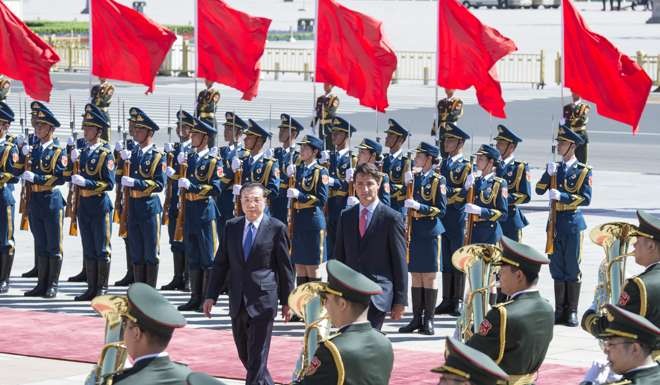
Justin Trudeau right to hit reset button on ties with China
Predecessor Stephen Harper’s hawkish attitude towards Beijing may have hurt Canada’s trade and business interests more than China’s
On the eve of Justin Trudeau’s high-stakes visit to China, The Globe and Mail, Canada’s national newspaper, ran an editorial cartoon that pretty much summed up how many Canadians feel about their youthful prime minister’s trip. It has Trudeau happily taking a selfie with his head inside the big mouth of a giant dragon.
While it may be an exaggeration to say the Liberal government under Trudeau has been bending over backwards for China, it has certainly been accommodating. A review of recent statements made on record by his top lieutenants shows how much he wants a better relationship with Beijing after years of friction under the previous Conservative administration of Stephen Harper. In this, he is following in his father’s footsteps, the brilliant Pierre Trudeau, despite the concerns of some of his fellow citizens.
Minister of International Trade Chrystia Freeland has described Harper’s decision not to join the Asian Infrastructure Investment Bank as a “lost opportunity of the previous government”. Ottawa is certainly having a serious rethink – Finance Minister Bill Morneau said in Beijing yesterday that Canada would apply to join the AIIB.

Morneau has also said he is considering relaxing restrictions on foreign investments that specifically target state-owned enterprises like those of China. Most of those rules were put in place by Harper after China National Offshore Oil Corp (CNOOC) bought the Canadian oil and gas company Nexen in 2012. At the time, there were fears that China’s state-controlled companies were targeting Canada’s strategic industries like oil sands.
Meanwhile, when the United States and many of its allies formed a chorus of condemnation in July when the Permanent Court of Arbitration delivered its ruling against Beijing over the South China Sea, Canada’s response was conspicuously neutral. In fact, Foreign Minister Stephane Dion waited more than a week after the ruling before issuing a statement.
Trudeau’s China policy should not be mistaken as appeasement. The reality is that China has become Canada’s second largest trading partner, after the US. Ottawa has no choice but to engage China. The Canadian business community has high hopes for Trudeau’s China visit.
The tough line that Harper took never made much sense and may have hurt Canada’s trade and business interests more than China’s. Trudeau is right to hit the reset button.

